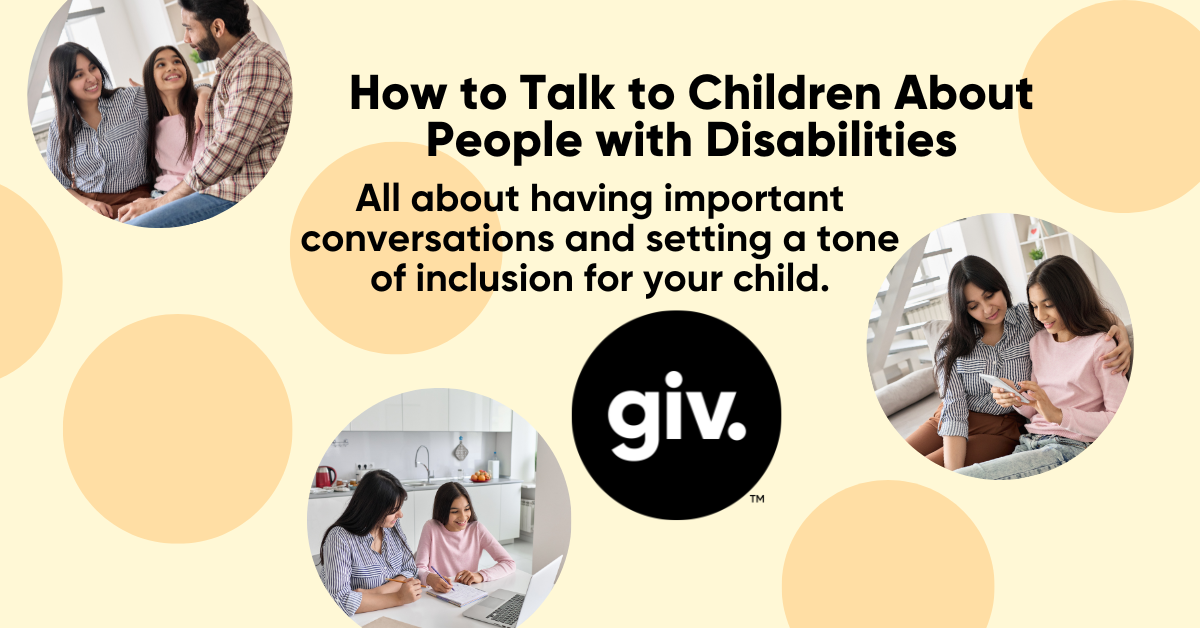Understanding the significance of fostering open conversations with your children, the topic of “How to Talk to Your Children About People with Disabilities” takes center stage in shaping a compassionate and inclusive mindset. In today’s diverse society, equipping parents with effective communication strategies is paramount, making discussions about disabilities an essential aspect of parenting.
Initiating these dialogues not only satisfies a child’s natural curiosity but also contributes to breaking down stereotypes and fostering a more understanding and inclusive community.
How to Talk to Your Children About People with Disabilities:
When discussing disabilities with your kids, it’s essential to approach the conversation with openness and honesty. Begin by acknowledging that everyone is unique, and some people may face challenges due to a disability. Encourage your children’s natural curiosity about the world around them, including the differences they may observe in others.
Use age-appropriate language to explain the concept of disabilities, emphasizing that these differences are a part of the rich tapestry of human diversity. Ensure your child understands that disabled children and adults are just as capable of leading fulfilling lives, fostering an inclusive mindset from a young age.
Answering Your Child’s Curiosity:
As children encounter individuals with disabilities, their natural curiosity often leads to questions. Address your child’s inquiries with patience and empathy, providing straightforward and age-appropriate answers. For instance, if a child asks about a classmate using a wheelchair, explain that they might have a physical disability that makes it challenging to walk.
Use these moments to teach your child about the importance of treating everyone with kindness and understanding, regardless of their abilities. By answering your child’s curiosity with openness, you not only foster their understanding but also contribute to breaking down stereotypes and promoting inclusivity.
Teaching Kids About Disabilities:
Teaching kids about disabilities involves instilling a sense of empathy and dispelling incorrect assumptions. Share examples of different disabilities, from cerebral palsy to learning disabilities, using age-appropriate language. Emphasize that disabilities can be visible, like using a wheelchair, or less apparent, such as a chronic illness or learning disability.
Encourage your children to describe people based on shared interests and unique characteristics rather than focusing on their disabilities. By providing direct answers to their questions and using everyday language, you help children understand that disabilities are just one aspect of a person’s identity, fostering a more inclusive and compassionate perspective.

Inclusive Play with Other Children:
Promoting inclusive play is crucial for creating a supportive environment for children with disabilities. Encourage your child to interact naturally with other kids, including those with disabilities. Teach them that everyone, regardless of physical ability or particular disability, enjoys the same games and activities.
Whether a child uses a wheelchair or has trouble talking, emphasize the importance of inclusion and shared experiences. By fostering inclusive play, you contribute to the development of friendships that transcend differences, creating a supportive community within the same school or neighborhood.
Connecting with Same-Age Peers:
Helping your child connect with same-age peers involves guiding them to focus on shared interests and common ground rather than differences. Whether a child has a visible disability like cerebral palsy or less apparent challenges like learning disabilities, encourage your child to approach others with understanding and acceptance.
Teach them that friendships are built on shared experiences, hobbies, and mutual respect, steering clear of assumptions based on appearances or abilities. By fostering these connections, you contribute to a more inclusive social environment, where children learn to appreciate each other for who they are.
Understanding Your Friend’s Disability:
When your child has a friend with a disability, it’s essential to help them understand their friend’s unique circumstances. Encourage open conversations, answering any of your child’s questions matter-of-factly. Whether it’s a friend who uses a wheelchair or has a developmental disability, explain the particular challenges they may face while highlighting their strengths and abilities.
By teaching your child about their friend’s disability in a supportive and informative way, you promote empathy, friendship, and a positive attitude towards diversity.

Kids and Less Visible Disabilities:
Children may encounter peers with less visible disabilities, such as chronic illnesses or learning disabilities. Help your child understand that not all disabilities are apparent, and some kids may face challenges that are not immediately visible.
Encourage them to be supportive and kind to all their peers, whether they have a visible disability or not. By promoting an understanding of less visible disabilities, you contribute to a more compassionate and inclusive school environment.
Breaking Stereotypes with Disabilities:
Challenge stereotypes surrounding disabilities by encouraging your child to see beyond preconceived notions. Teach them that individuals with disabilities, whether physical or developmental, are unique and capable individuals.
Provide examples that break down common misconceptions, fostering a more accurate and inclusive view of people with disabilities. By addressing stereotypes head-on, you empower your child to become an advocate for inclusivity and understanding.
Navigating Tough Questions About Disabilities:
Children may pose tough questions about disabilities, and as a parent, it’s crucial to navigate these inquiries with grace and honesty. Encourage a safe space for your child to ask questions, providing direct answers without shying away from the complexities of the topic.
Emphasize that it’s okay not to have all the answers, but what matters is fostering an open dialogue. By navigating tough questions with patience and understanding, you equip your child to approach discussions about disabilities with empathy and a willingness to learn.

Engaging in conversations about disabilities with your children is not just a parenting responsibility but a crucial step towards creating a more inclusive and empathetic society. By adopting open communication, answering your child’s curiosity with patience, and teaching them about the diverse nature of disabilities, you lay the foundation for a future where differences are celebrated.
Encouraging inclusive play, fostering connections with same-age peers, and breaking stereotypes surrounding disabilities contribute to a community where every child, regardless of ability, feels accepted. Navigating tough questions with honesty and understanding ensures that your child grows up with the knowledge and empathy needed to appreciate the unique qualities in every individual.
Embrace the power of these conversations, and together, we can raise a generation that sees beyond differences, creating a world where everyone is valued for who they are.






